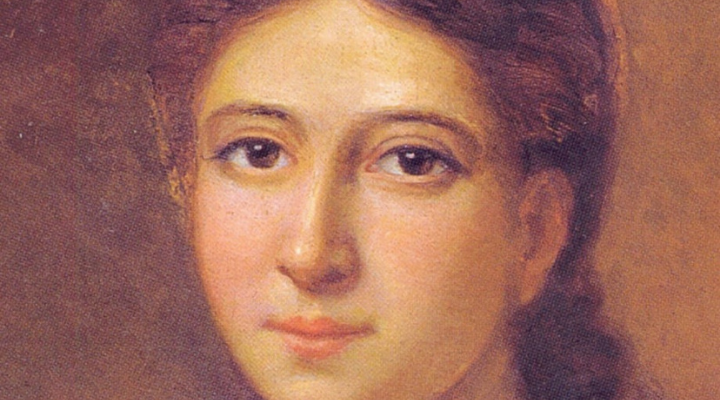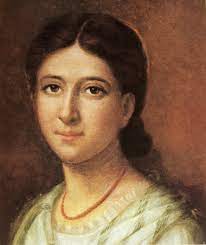
On May 22, she was beatified in her hometown of Lyon. Pauline Jaricot (1799-1862). Foundress of the Work for the Propagation of the Faith, the forerunner of the Pontifical Missionary Works, and of the Living Rosary, a Marian devotion based on the contemplation of the mysteries.
She was a French laywoman, who lived through a time of change, from the Napoleonic Empire to the first industrial revolution, and became fully aware of the social dimension of Christianity in a city linked to the silk industry.
Pauline was the daughter of Antoine Jaricot, an important textile entrepreneur, who got his own business thanks to the help of his employer. She was raised as a Christian by her mother, Jeanne Lattier, and lived a happy childhood in a family of seven siblings.. She was a beautiful and flirtatious girl, a friend of social gatherings and parties, and in 1814 she was pleased to be part of the entourage of 50 young Lyonnaise girls, companions of the Duchess of Angoulême, daughter of Louis XVIII, who visited the city a few months after the fall of Napoleon. At the time, as she later admitted, she thought she was "worthy of universal admiration and walked tall with the pride of a peacock".
They were the years of the Restoration, when the French bourgeoisie, together with the survivors of the old nobility, wanted to leave behind the memory of revolutionary times.But that era had left an almost indelible mark on France. The alliance between the throne and the altar, officially established, turned out to be artificial, because the hearts and mentalities had been drifting away from Christianity. A religious patina persisted, although in Lyon's high society what really mattered were health, fortune and reputation.
Pauline Jaricot was a girl with class pride. With her silk dresses and ruby-studded shoes, she attracted everyone's attention when she went to the Mass Sunday at the church of Saint Nizier. On one Lenten Sunday in 1816, the parochial vicar Jean Wendel Würtz preached. His words were a wake-up call against vanity and its false illusions, and people's eagerness to prefer appearance to being. Pauline felt that she could identify with him, and after Mass she went to the sacristy to ask Würtz to help her change her life. and become his spiritual director.
The young woman's first decision was to radically change her outfit. Lwould wear a purple dress, like the one worn by textile workers.a white hood and clogs. But his aspirations were not to join a religious order, but to put himself at the service of others, and in particular to improve the living conditions of the silk workers.I had hardly had any eyes for them until then.
Pauline Jaricot's decision was not based on sentimental impulse. She was a woman of plans sustained by a life of prayer. Piety and charity formed a whole in her.. He was aware that the men, women and children in the silk industry were subjected to harsh working conditions, often working 15 to 18 hour days, where they were paid by the piece, in a mechanical application of the law of supply and demand.
He had seen firsthand the slavery of tireless work, which trampled on people's dignity and alienated them from both their family and their faith. There was a proliferation of children without parents, the sick and the elderly abandoned to their fate. It is not surprising that in 1831 and 1835 there were violent insurrections of silk weavers in Lyon, which were crushed by the army. In those years, only 200 meters from Pauline's house, lived Pierre Joseph Proudhon, the socialist who proclaimed that property was theft and that it was time to replace religion with justice.
At a certain point in time Pauline Jaricot devised a "universal bank for the poor", which would provide free loans to enable workers to live a dignified life.. The banker Gustave Perre and his partner, who showed outward signs of Christian piety, contributed money, but in their speculative eagerness for quick profits. embarked Pauline on the purchase of blast furnaces that drove her into debt for the rest of her life.and to be pursued in court by its creditors.

Pauline Jaricot, (Lyon, July 22, 1799-Lyon, January 9, 1862).
Not only did he lose his family assets, but his reputation was also ruined. Disappointment did not take root in Pauline's life because her hope in Christ was much stronger.. These were then his words:
"I want to believe that all is not lost, even if I no longer have human resources, even if dangers insist on assailing me and reproaches grow from all sides. Lord, if you are with me, I have lost nothing."
To warm the soul through the flames of hope and faith. This is what Pauline Jaricot once spoke about with the priest of Ars. She felt weak, but she harbored no fear because her hope was in Christ.
With the collaboration of: Antonio R. Rubio PloDegree in History and Law. Writer and international analyst @blogculturayfe / @arubioplo